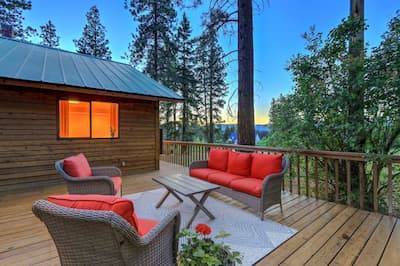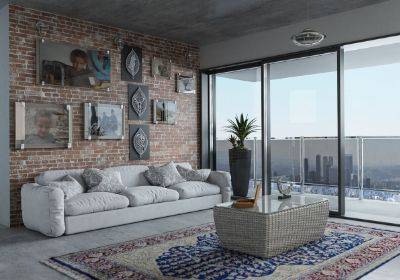Homeowners Insurance on a Second Home in Ontario
There’s no place like home—except your second home. There are many reasons why you may need or want a secondary residence, but regardless of how you choose to use it, it’s essential to make sure your second home isn’t going to cause unexpected financial setbacks. From fire and natural disasters to vandalism and beyond, a lot can go wrong to cause damage or destruction to a house, and your secondary home is even more vulnerable because you likely spend less time there than you do at your primary residence.
Fortunately, you don’t have to be living in your second home year-round to get the peace of mind that comes with knowing you have financial protection in the event of a loss. Speak with your Morison Insurance broker today to start a second home insurance quote, so you can sleep easily at night regardless of which home you’re in.
What Is Second Home Insurance?
Second home insurance provides physical damage coverage for a second home you own that is not considered your primary residence. Examples of second homes include a weekend house, summer home, vacation home or a condo in the city you stay at after attending sporting events or concerts. A second home can also include a home that you allow your children to occupy on a full-time basis.
A standard home insurance policy offers coverage for your primary residence. Your primary home is the house you reside in most often and regularly. A second homeowner’s policy may also be for a routinely occupied residence but less frequently than your primary home.
Who Needs Second Home Insurance?
You will require second home insurance if you own a second home, whether a house or condo, that you occupy in addition to your primary residence. A home, whether it’s your primary, secondary, or beyond, is a huge investment, and you need to protect yourself against major financial setbacks so you can rest assured that your investment will stand the test of time and can be rebuilt or repaired if disaster strikes.
Does a Homeowners Insurance Policy Cover a Second Home?
Your primary homeowner’s insurance policy will not provide coverage for a secondary residence. Many insurance companies do not require a new policy to receive coverage for your second home. The insurance company can add your second home to your existing homeowners insurance policy if you have a second home, update or complete a new home inventory list to include the items at your secondary residence.
It is important to be aware that you cannot purchase better coverage for your secondary residence than you have for your primary residence.

What Does Second Home Insurance Cover?
Second home insurance can cover you for physical damage to the dwelling and outbuildings, such as a shed, coverages for your personal property and the loss of use of the dwelling. The condition, use, and location of the second home are among the factors that determine insurance coverage for your specific property.
There are three main policy forms available to property owners; Fire and Extended Coverages, Broad Form Coverages, and Comprehensive Coverages.
- Fire and Extended Coverages Form: A fire and extended coverage form is a basic fire insurance policy that will insure your second home against only specific perils listed on the policy, which include, but are not limited to, fire, wind, and explosion.
- Broad Coverages Form: A broad form insurance policy will insure your dwelling (house structure) on an all-risk basis. All-risk basis means that if there is no specific exclusion listed on your policy, there is coverage. However, coverage of your personal property is only for the perils specifically listed above.
- Comprehensive Coverages Form: A comprehensive form insurance policy provides the best coverage a company can offer. This type of insurance policy is ruled based on the exclusions. This means both your dwelling and personal property are insured on an all-risk basis. If there is not a specific exclusion, there would be coverage.
What Are Some Additional Second Home Insurance Coverages To Consider?
Additional home insurance coverages to consider adding to your policy include sewer backup, overland water, identity theft, and bylaw coverage.
- Sewer Backup Coverage: Sewer backup coverage protects against damage caused by the overflow of a sump pump or any damage caused by the “backing up” of water through your plumbing systems, such as toilets, sinks, or bathtubs.
- Overland Water Coverage: Overland water coverage protects against damage caused by freshwater that sits on top of the ground and enters your home, either from torrential rains or a massive spring thaw.
- Bylaw Coverage: Local bylaws change and develop over the years, and new bylaws are often added to the list of requirements when building a home. If you were to lose your home entirely and must rebuild, you are subject to the current bylaws. In some circumstances, adhering to the required bylaws could be an additional expense. Bylaw insurance coverage for your second home will cover those other expenses up to the purchased limit. For example, a current bylaw may require that homes be a specific distance from a sidewalk or public road. If your home does not meet present-day guidelines, the foundation of a new structure would need to meet current bylaw requirements. Bylaw coverage is good insurance protection to have if you have to meet new bylaw requirements.
- Umbrella Liability Coverage: Personal liability coverage is generally a part of any homeowners insurance, but the coverage limits may need to be adequately matched to your level of liability risk exposure. Umbrella liability coverage is additional liability insurance that can be accessed once the coverage limits on your main liability policy have been reached. This means you are less likely to have to pay out of pocket for legal costs and settlement expenses if you have legal action brought against you in court.

Is Guaranteed Replacement Coverage Available for Second Home Insurance?
Guaranteed replacement coverage is a highly recommended option for homeowners insurance on a second home. Your second home is a treasured investment, whether you’re planning to sell it in a few years, or you have a vision of passing it down through the generations of your family. As we all know, sometimes the future doesn’t pan out exactly how we expected. Disasters such as floods, fires or natural disasters could destroy your secondary residence, and if that happens, you need to know that you can have it rebuilt to the same high standards that attracted you to the property in the first place. This endorsement allows for the payment in full of the costs of replacing the home even if this amount exceeds the policy limits, however a home evaluation will need to be completed to be eligible for this coverage.
Suppose you have guaranteed replacement coverage on your second home insurance policy. In that case, you can rest assured that you will be eligible to receive insurance compensation in the amount it will cost to rebuild the physical structure of your secondary home as it was before it was destroyed. No matter what happens, you’ll have the support you need to return your house to its pre-claim glory.
Why Does the Guaranteed Replacement Cost Differ From the Purchase Price?
This is a common point of confusion among policyholders, but it makes sense once you understand how these two differing costs are evaluated. The real estate purchase price of any property, including your second home, is determined by various factors, and one of the most important considerations is the property’s location. A house in a highly desirable location will always be worth more than an identical home in a less desirable location because buyers are willing to pay more for their preferred location. Another huge factor in real estate evaluation is what the market will bear, which is determined by comparing the costs of similar homes in the area that have recently sold.
But when it comes to the cost of rebuilding a home after a disaster such as a fire, location and comparable values don’t matter. All that matters is the actual cost of rebuilding the house structure as it was previously, meaning the necessary materials, components and skilled labour. That’s why the guaranteed replacement cost may be higher or lower than what you actually paid for the home, but it’s rarely similar.
Do I Need to Inform My Insurance Broker If I Do Renovations or Upgrades at My Secondary Home?
Just like at your primary residence, it’s essential to make sure your insurance broker knows about any upgrades or renovations so they can make sure you have adequate coverage limits on your second home insurance policy. If you have guaranteed replacement coverage, for example, and it’s not updated following renovations, the cost of the renovations will not be covered by the guaranteed replacement value insurance. When you invest in a remodel or upgrade, it’s because that’s how you want your home to look and function—so if the house has to be rebuilt, you’ll naturally want those features included again. Notifying your insurance broker about upgrades and remodels protects your investment for the future.
Is Second Home Insurance More Expensive?
Second home insurance may be more expensive than your primary homeowner’s insurance. The reason is the probability of a loss is higher for a residence that isn’t occupied full-time. You could potentially not visit your second home for days or weeks, during which you could have suffered a loss and not be aware of it. Typically, these kinds of losses are catastrophic if no one is at the residence to prevent further damage.
Prevention is vital when you own a property that you are unable to occupy daily. Having a home alarm system or, at the very least, having a friend or neighbour monitor your home and notify you of any potential issues are good preventive measures.
How Much Does Second Home Insurance Cost?
Second home insurance can cost you between $1,000 and $2,400 annually. Many factors determine the cost of your second home insurance, including:
- Condition of the residence
- Location of the residence
- Fire protection proximity
- How you use the property
- How frequently you reside there
- Style of the home
- Type of construction
- Square footage
- Upgrades or renovations
- Your insurance claims history
Ensure that you disclose all necessary details of your second home to your Morison Insurance broker when you start a second home insurance quote, so your property can be properly assessed for the best second home insurance coverage.
What Are Some Ways To Save Money On Second Home Insurance?
You can save on your Ontario second home insurance by having home insurance discounts applied to your policy or by increasing your deductible. Some discounts you may be eligible for include claims-free discounts, multiple-property discounts, discounts for risk-prevention systems and monitored home alarm discounts. Below is a list of more discounts available.
- Fire & burglar alarm discount
- Mortgage-free discount
- Multi-property discount
- Tankless water heater discount
- Mature-age discount
- Claims-free discount
- And more!
It is important to discuss all the details of your second home with your broker, not only to adequately insure it but also to ensure that all possible second home insurance discounts are applied.
Can I Rent My Property on a Short Term Basis?
Since you aren’t constantly residing in your secondary property, it may have occurred to you that you can use it to bring in some additional income on the short-term rental market. It’s important to understand that homeowners insurance does not cover this for a second home. If you plan to live in your secondary residence part-time and rent it out part-time, you need both second home insurance and rented dwelling insurance or landlord insurance. If something happens to the property while you are renting it out, all or part of the damage will not be covered by your second home insurance. This is because renting a property puts it at a higher risk of damage than if the only occupant is the homeowner.

Where Can I Get Second Home Insurance?
You can get a second home insurance quote from a licensed, reliable insurance broker such as the experts at Morison Insurance. An Ontario insurance broker will ensure you have the proper coverage for your second home at the best value. Since we work for our clients, not for the insurance companies, we put your best interests first and will work tirelessly to ensure you have the right second home insurance coverage for your unique circumstances. Speak to an expert insurance broker by calling 1-800-463-8074.
100+ Years
Online Reviews
Specialist Team
Clients Money

